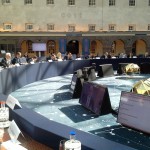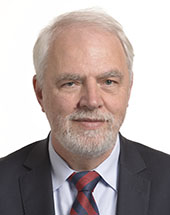EU Capitals Mayors’ Meeting in Amsterdam
 Matthijs van Miltenburg and Jan Olbrycht represented the URBAN Intergroup during the fifth EU Capitals Mayors’ Meeting which took place in Amsterdam on April 20th and 21st. The meeting gathered together 27th Mayors of the European capital cities and Corina Cretu, Commissioner for Regional and Urban Policy to directly discuss the future of European cities.
Matthijs van Miltenburg and Jan Olbrycht represented the URBAN Intergroup during the fifth EU Capitals Mayors’ Meeting which took place in Amsterdam on April 20th and 21st. The meeting gathered together 27th Mayors of the European capital cities and Corina Cretu, Commissioner for Regional and Urban Policy to directly discuss the future of European cities.
In the context of the EU Urban Agenda and the approval of the Pact of Amsterdam scheduled for May 30th, Mayors shared their views on challenges that European cities are facing. They debated about air quality and urban mobility, growing need for affordable housing, promotion of dialogue and fight against radicalization. Moreover, big part of the discussion was devoted to the refugee’s crises. Participants exchange their experience how to provide temporary shelter and promote integration and inclusion of refugees in urban society.
Matthijs van Miltenburg (NL), ALDE MEP and shadow rapporteur on the Urban Agenda in the European Parliament, intervened on the topic of integration and social inclusion of refugees in urban societies. “Cities are in a central position regarding the social, humanitarian and financial challenges caused by the influx of refugees. One of the key challenges is to not only provide shelter at the short term, but also to ensure integration in the long run. In my opinion, Member States should take their responsibilities and implement the European agreement on the relocation scheme for refugees, based on the principle of solidarity. In order to facilitate the reception, support and integration of refugees at a local level, European funds should be made directly available for cities and city regions” sais Van Miltenburg.
During the meeting Declaration by the Mayors of the EU Capital Cities on the EU Urban Agenda and Refugee Crisis has ben adopted.
Jan Olbrycht, stressed in his talk about the further development of the EU Urban Agenda that the leadership is needed after the Dutch Presidency of the Council. He insisted on the fact that “the EU institutions, including the European Parliament, want to help cities, along subsidiarity principle, to face current challenges, and not to replace cities”. Moreover, the European Parliament, as co-legislator, will need direct contact with the partnerships of the EU Urban Agenda and preliminary results during the work on the regulations for the next financial perspective.
Urban dimension of financial instruments – meeting in Strasbourg on April 14th
 Last meeting of the URBAN Intergroup which took place on Thursday, April 14th at the European Parliament in Strasbourg was devoted to the financial instruments (FI).
Last meeting of the URBAN Intergroup which took place on Thursday, April 14th at the European Parliament in Strasbourg was devoted to the financial instruments (FI).
Frank Lee, Head of Financial Instruments Advisory Division from the European Investment Bank, made the presentation “What next after JESSICA? The urban dimension of financial instruments in 2014-2020“. At the beginning of the meeting some reasons of using FI was underlined which are: a more efficient use of public sector resources, especially for revenue generation or cost saving projects; good leverage potential, also through recycling of funds; added financial discipline into the project; possibility of combining them with technical support and/or capital grants to overcome market barriers. In reference to the last point, it has been stressed that particularly in the urban environment there is a need to combine grants with FI and the balance between both is very important.
During the presentation JESSICA initiative was summed up as well as different urban models of using FI in the 2007-2013 financial perspective. Lithuanian case study was highlighted in which combination of loans and grants let renovate multi-apartment buildings. Moreover, Northwest England case study showed how 16 local authorities run Urban Development Fund which provides debt funding for urban regeneration projects. During the debate, MEPs agreed that the FI must be tailored into the local needs. In conclusion, Jan Olbrycht, President of the URBAN Intergroup, underlined that ex-ante conditionality is the way to choose best instrument for concrete challenge and that in general there is a growing debate about the financial instruments inside the cohesion policy.
Urban dimension of financial instruments in 2014-2020 – Frank Lee’s presentation
A sustainable way of achiving EU economic and social objectives – Financial instruments
London Green Fund – Case Study
More information about Fi-compass




